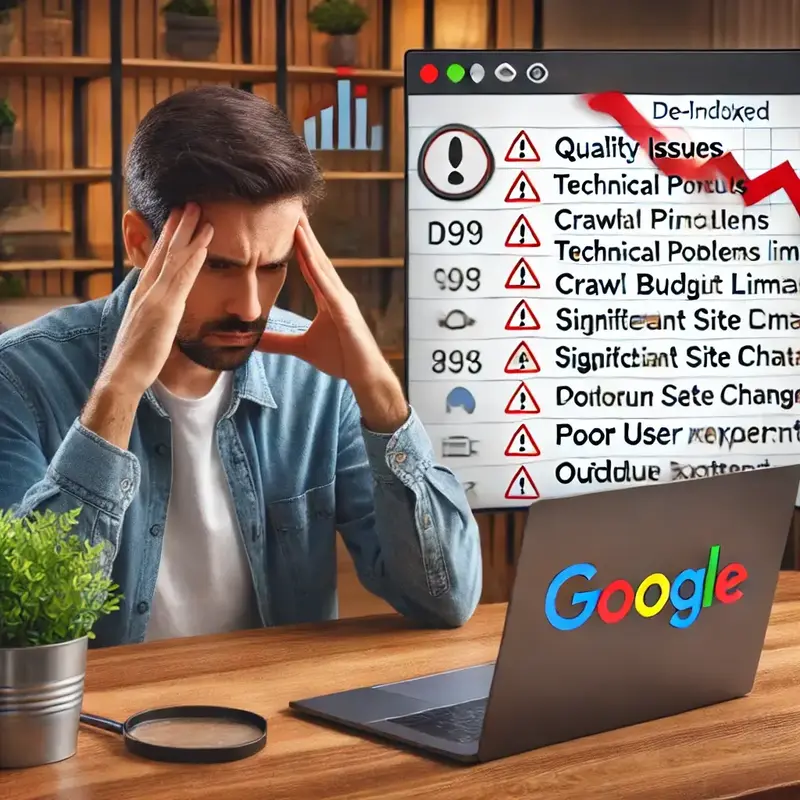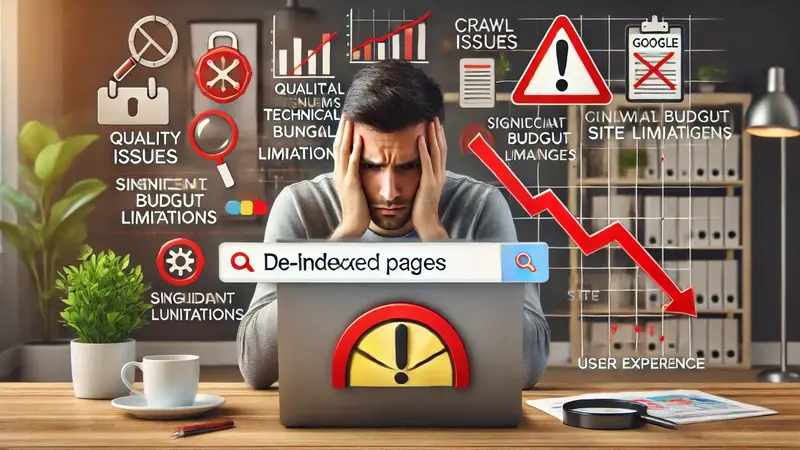In this comprehensive guide, we will explore 8 common reasons why Google might be de-indexing your website pages. By understanding these factors, you can take proactive steps to address potential issues and ensure your site remains a valuable resource for users and search engines alike. Whether you’re a seasoned webmaster or a novice site owner, this guide will provide you with the insights and solutions needed to navigate the complexities of Google’s indexing processes and keep your website performing optimally in search results.
8 Reasons For De-Indexing Webpages
In my search, I have to get 8 reasons for de-indexing webpages in Google Search Results. By reading this reason, you will be able to solve the whole process and technical issues. Your site will get a high ranking if you keep these reasons in mind. Here are the 8 reasons below.

1. Quality Issues
Quality issues are one of the primary reasons Google de-indexes webpages. Low-quality content, such as duplicate content, thin content, or content with little to no value to users, can lead to de-indexing. Google aims to provide the best possible search experience, so it prioritizes high-quality, relevant, and informative content.
Solution: Conduct a thorough content audit to identify and improve low-quality pages. Ensure your content is original, comprehensive, and provides real value to your audience.
2. Technical Problems
Technical issues can prevent Google from properly accessing and indexing your website. Common technical problems include incorrect use of robots.txt, broken links, server errors, and improper use of canonical tags.
Solution: Regularly check your website for technical errors using tools like Google Search Console and fix any identified issues promptly. Ensure your site’s robots.txt file is correctly configured and that there are no server errors preventing Google from crawling your site.
3. Manual Penalties
Google can impose manual penalties on websites that violate its Webmaster Guidelines. These penalties can lead to the de-indexing of specific pages or even entire websites. Common reasons for manual penalties include unnatural backlinks, spammy content, or manipulative SEO tactics.
Solution: Review and adhere to Google’s Webmaster Guidelines regularly. If you receive a manual penalty, use Google Search Console to identify and address the issue and then submit a reconsideration request.
4. Crawl Budget Limitations
Google allocates a specific crawl budget to each website, which is the number of pages it will crawl and index within a given time frame. If your website exceeds this budget, some pages may not be indexed.
Solution: Optimize your crawl budget by crawling only essential pages. Use the robots.txt file to block non-essential pages, reduce duplicate content, and ensure your website’s structure is efficient.
5. Significant Site Changes
Major changes to your website, such as redesigns, URL structure changes, or large-scale content updates, can confuse Google and lead to temporary de-indexing as it re-evaluates your site.
Solution: When making significant changes, implement proper redirects and update your sitemap. Use tools like Google Search Console to notify Google of these changes and monitor indexing status closely during the transition.
6. Algorithm Updates
Google frequently updates its algorithms to improve search quality. These updates can impact how your site is indexed and ranked. Some updates may devalue certain types of content or penalize sites that don’t meet new criteria.
Solution: Follow industry news and Google’s official announcements to stay informed about algorithm updates. Regularly update your site to align with best practices and new algorithm requirements.
7. Outdated Content
Google prioritizes fresh, relevant content. Pages with outdated information or no longer relevant content may be de-indexed to make way for newer, more pertinent content.
Solution: Regularly update your content to ensure it remains current and valuable. Remove or improve outdated pages and ensure all information is accurate and up-to-date.
8. Poor User Experience Metrics
Google assesses a webpage’s quality using various user experience metrics, such as page load time, mobile friendliness, and bounce rate. Poor performance in these areas can lead to de-indexing.
Solution: Optimize your website for a better user experience. Ensure your site loads quickly, is mobile-friendly, and provides an engaging and intuitive user experience. Use tools like Google PageSpeed Insights to identify and fix performance issues.
Conclusion
Understanding why Google might de-index your website pages is crucial for maintaining a strong online presence. By addressing quality issues, fixing technical problems, adhering to Google’s guidelines, optimizing your crawl budget, managing site changes, staying updated with algorithm changes, keeping content fresh, and improving user experience metrics, you can minimize the risk of de-indexing and ensure your website remains visible in search results.
Regular monitoring and proactive maintenance are key to sustaining a healthy website that continues to perform well in Google’s search index.
